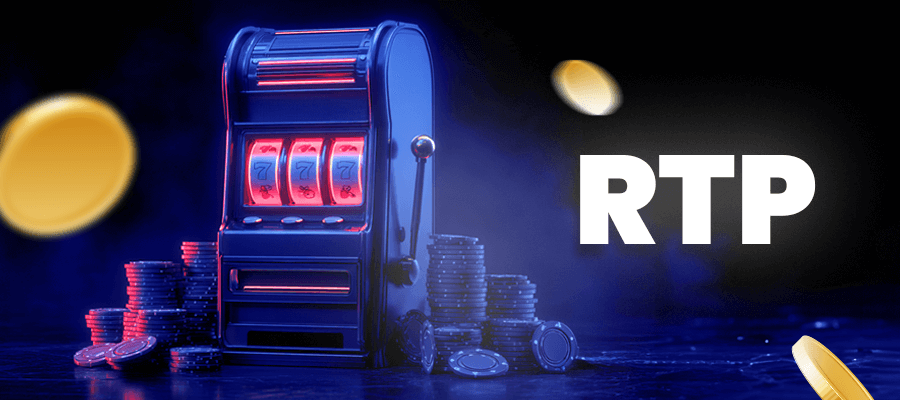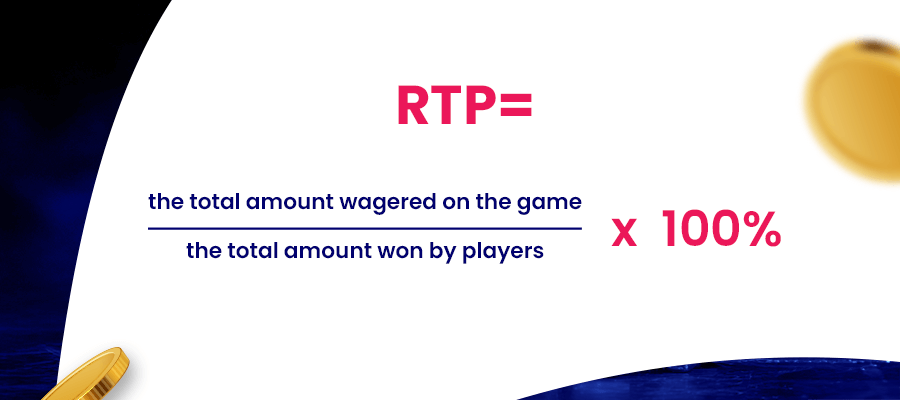What is RTP?: “Return To Player” Explained
Finding the meaning of RTP and showing how you can benefit by understanding itReturn to player, or RTP, is exactly what it sounds like: the sum that you get back from the money you wager. Knowing your RTP - from games that include slots, blackjack, and roulette - allows you to understand the theoretical payoff of the game you are gambling at. You can then pursue games with the odds and action that best suit you.
What Does RTP Mean?

RTP means Return to Player. It is the percentage of payback that a game ultimately returns to players over time. It does not mean that a player will receive that amount over the course of a session or even a lifetime. But, over millions of slot machine spins or hands of blackjack or turns of the roulette wheel, this is the number that a game or machine is calibrated to pay out.
It is a theoretical long-run average. For example, a slot machine with 98% RTP will eventually pay off £98 for every £100 put in. Over the short run, though, a session of slots can eat up £100 worth of bets or yield more than £98 of RTP.
However, embracing unpredictability is part of what makes gambling enjoyable. Knowing what they are up against helps make gamblers smart.
Calculating RTP With a Simple Formula

From the players’ perspective, RTP is straightforward to calculate. A slot machine with an RTP of 98% will, over the long term, return 98% of the money wagered. The casino will keep 2%. That is its profit.
It is known as the casino’s theoretical win and the player’s theoretical loss. As explained above, this uneven divide plays out over the long term. But in the short run, due to variance, outcomes are rarely so clean.
Digital slot machines, which are always played online, benefit from current technology. Using a random number generator (RNG) to produce totally unpredictable outcomes in the short term, they are meticulously programmed to achieve a predetermined RTP in the long term.
Quick Math Examples
For example, a UK slot machine designed to offer a 2% RTP will, over time, return £98 for every £100 inserted.
If the RTP is 96%, the machine would ultimately give back £96 for every £100 put into play.
Here are some examples of how payouts work with various RTPs. Please note, though, that these are long-run expectations. The reality, loaded with variance, is almost always much choppier.
Consider £500 wagered on a slot machine with 96% RTP. In that instance, the expected loss for the player is £20 (£4 for every £100 wagered). The house edge is 4%, derived by subtracting 96 from 100.
It is important to note that RTP does not only apply to slot machines.
The Realities of Cash-in and Cash-Out
That said, all players will not receive this money equally.
One player, for example, might win £96 from £100 wagered (resulting in a total of £196) while another player loses £100 out of £100 wagered. The casino would receive its expected 2%, but the outcome for each player is very different.
Estimating Expected Loss From Return to Player
The other side of RTP is the house edge. If the RTP is 98%, this means that the house edge is 2%.
In light of that, the house edge, which is the player’s expected loss, can be calculated thusly:
Total Wager – RTP = Expected Loss
For example, if you wager a total of £2,000 and RTP is £1,900 (or 95%), the expected loss is £100.
When playing in the best uk casino sites, it is wise to gamble safely. This means that players should set session budgets. If you plan on playing with, say, a total of £100 and that money is lost, walk away from your computer and find something else to do.
There are always other days of gambling, and it is best not to exceed your budget for playing.
Volatility May or May Not Be Your Friend

Always keep in mind that RTP is a theoretical number. It irons itself out after millions of hands, spins, or rolls of the dice.
In the short term, due to the volatility of a casino game, you may win or lose much more than what the RTP equals.
Play 100 hands of blackjack, wagering £10 per hand, and there is no guarantee that the house will win .5% and that the player will walk away with £995.
The excitement of gambling derives from its unpredictability, which is often characterised as a “hot deck” or a “cold deck”. In the case of a hot deck, a player might cash out with a profit of £200 after 100 hands of play. When the deck runs cold, losses can be extreme in the other direction.
High RTP does not equal frequent wins. Players should remain aware of this and not believe that the numbers will work themselves out in the short run – or maybe even over the course of a player’s lifetime.
RTP in Online Casinos

When it comes to gambling, transparency is critical. Gambling laws in the United Kingdom ensure that casinos maintain transparency and that players are aware of the RTP built into the games they play.
A regulation known as UKGC RTS 3C mandates that RTP or equivalent probabilities are easily available before play begins. That way, even though RTP does not guarantee an outcome, at least gamblers know the long-term Return to Player.
RTP notices are displayed on the homepage of an online casino and/or on the game itself. The information may be included on the “How to play” page or on the game selection page. Regardless, as the law mandates, it will be easy to identify and understand.
In the case of video poker, a pay schedule for each possible hand is prominently displayed.
In virtual card games, there will be details on the number of decks and frequency of shuffles.
For progressive slot machines, where a jackpot can be won, displays of the jackpot amount will be frequently updated.
Players are generally informed of potential winnings through both the basic game and the jackpot component. That said, the disclosure practices may vary depending on jurisdiction and casino operator policies.
Regardless of the circumstances, players should familiarise themselves with RTP and take comfort in the information it provides.
Who Verifies RTP in Online Casinos?
Each game’s manufacturer computes theoretical RTP. Engineers at those companies understand how the games play and are well-equipped to confirm the Return to Player that has been programmed into each game.
But just the manufacturer’s take on what the RTP should be is not enough. As mandated by the UKGC (United Kingdom Gambling Commission), the RTP is further confirmed by independent labs that perform game testing and certification.
These companies include eCOGRA and GLI. They both use their own technology to confirm that the games played as promoted, are entirely secure, and provide the promised RTP.
Even after the game is put into play on a website, testing and monitoring continue. This promises that nothing has changed and that there are no anomalies. It is all about maintaining integrity for the site and for the players.
It is worth noting that RTP policies can vary by jurisdiction. It is always best to ensure that RTP is held to a high standard. According to the Malta Gaming Authority, for example, the minimum RTP is 85%.
This means that the theoretical Return to Player for every £100 wagered will be no less than £85, over the long term, for every game on offer.
Slots RTP
For most online slot machines, the average RTP is around 96% and it goes as high as 98%.
While the Return to Player Numbers have been calculated by slot manufacturers and confirmed by licensed labs, such as eCOGRA and GLI, they are precise only in the long term after millions of spins.
The numbers are theoretical and vary widely in the short term due to the variance and volatility that come with gambling.
Suppose you want to explore specific examples of games with higher payout percentages. In that case, you can check this curated list of high RTP slots, which helps players identify the best slots to play that statistically return more over time.
Roulette RTP

If you like variety, online roulette is an alluring game to play online. There is Multi Wheel Roulette (players can bet on as many as eight wheels spinning at the same time), Astro Roulette (astrological signs replace the standard numbers), and Lightning Roulette (lightning strikes between one and five numbers per spin, generating bonuses).
Those are just a few of the many options.
Purists tend to go for American roulette or European roulette. They are the standard forms seen in brick-and-mortar casinos.
The two games look similar, but, in terms of RTP, they differ greatly. American roulette has an extra slot that the ball can drop into. It is 00 and, as you will see below, it reduces the RTP.
American roulette has a house edge of 5.26%. This yields an RTP of 94.74%. It means that for every £100 wagered, over the long term, players will retain £94.74 while losing £5.26.
European roulette offers a higher RTP than American roulette.
Lucky for players who prefer more exotic forms of the game, the three listed above each have an RTP of 97.30%, just like European roulette, and, in the long run, offer higher RTP than American roulette.
Calculating Roulette RTP
In roulette, a game with fixed odds that are the same for every player, RTP is an important feature.For the game of American roulette, where the double-zero is one of the wheel’s numbers, the Return to Player is 94.74%.
Doing the math, this means that for every £1,000 wagered, the player will, in the long run, receive back £947.40. With the house edge at 5.26%, players will lose £52.60 for every £1,000 wagered.
Calculating Roulette RTP
In roulette, a game with fixed odds that are the same for every player, RTP is an important feature.
For the game of American roulette, where the double-zero is one of the wheel’s numbers, the Return to Player is 94.74%. Doing the math, this means that for every £1,000 wagered, the player will, in the long run, receive back £947.40. With the house edge at 5.26%, players will lose £52.60 for every £1,000 wagered.
Blackjack RTP
At its best, played with perfectly executed basic blackjack strategy and with optimal rules – blackjack paying 3-2, dealer standing with soft 17, and re-splitting Aces – the house edge is .5%, which creates an RTP of 99.5% over the long term. This means that for every £100 wagered, the player leaves with £99.50 and the house earns 50 pence.
However, with just one rule change – blackjack paying 6-5 – the house edge goes to nearly 2%. This means that the RTP is a little more than 98% over the long term.
This may not sound like much. However, if you play enough hands of blackjack, the odds will eventually add up.
As with all casino games, when playing blackjack online, it pays to find the highest RTP available. While it does not guarantee winning money over the course of a single session, it does provide the best opportunity for a player.
Calculating Blackjack RTP
In the case of blackjack, RTP it is based on every correct play being made, meaning that the player always splits 8s and always hits 16 against a dealer’s face card, among other mathematically correct moves.
For a player who wagers at blackjack and plays perfect basic strategy, meaning that he is performing optimally with the turn of each card, the house edge is .5%.
This results in an RTP of 99.5%. It means that for every £1,000 wagered, there will be an expected loss of £5. But, as with all of these formulations, that is a theoretical number.
Myths and Mistakes about RTP
- “If I play a game with 95% RTP, I will end the session with £95 for every £100 I wager.”
This is false, as RTP is a theoretical number based on the mathematical principles of the game, calculated over millions of simulated plays. In the course of a single session, due to variance and volatility, RTP can be significantly more or less than the 95% that exists over the long term.
- “Casinos freely change RTP remotely and don’t tell anyone”.
This is false since, according to UK gaming laws, RTP must be posted clearly on all games. In regulated markets, any changes to RTP require disclosures. Regulations create transparency, which is good for players.
- “If I lose enough money, the casino will increase the RTP on my game so I can win back my money”.
This is false since the RTP of a game cannot be changed to accommodate an individual playing that game.
Reminders about Safe Gambling
Always keep in mind that high RTP does not guarantee frequent wins. RTP is a theoretical number that plays out over a long period of time. The true excitement of gambling lies in its unpredictability and variance, which can both lead to significant losses. As a player, you should be clear-headed about your gambling, always remain in control and set limits for how much you want to win or lose. For further information, please refer to our Safer Gambling guide.
